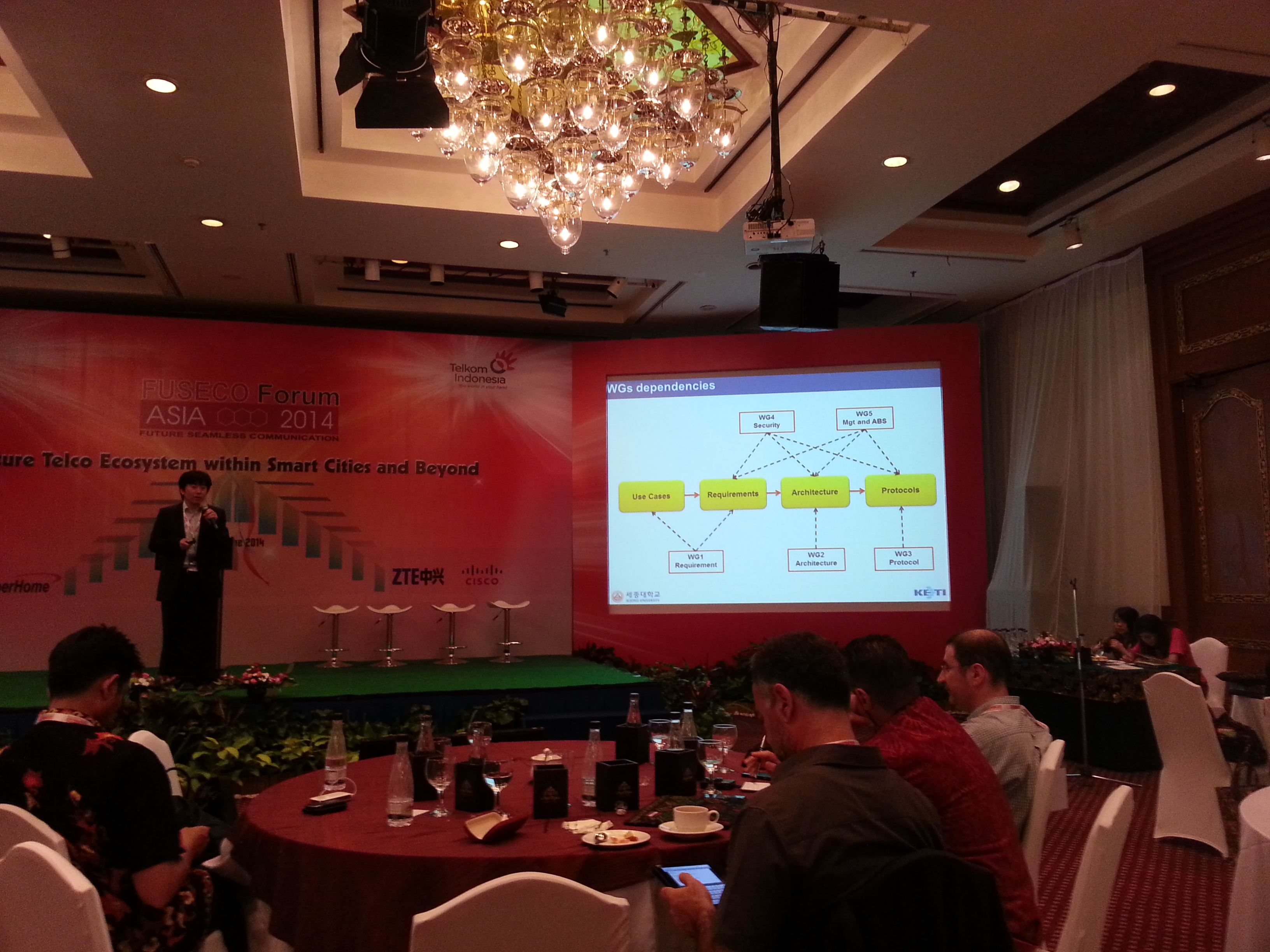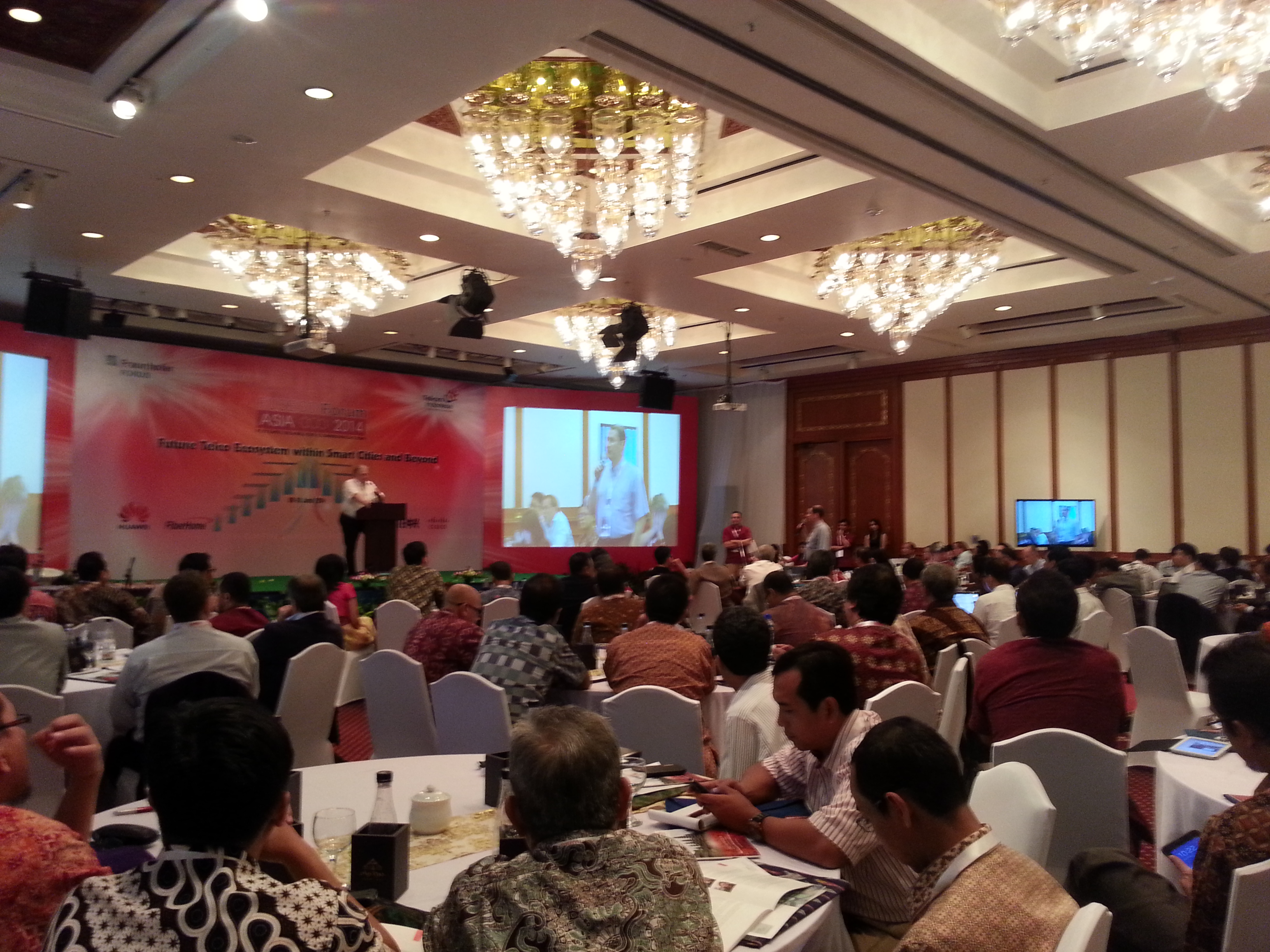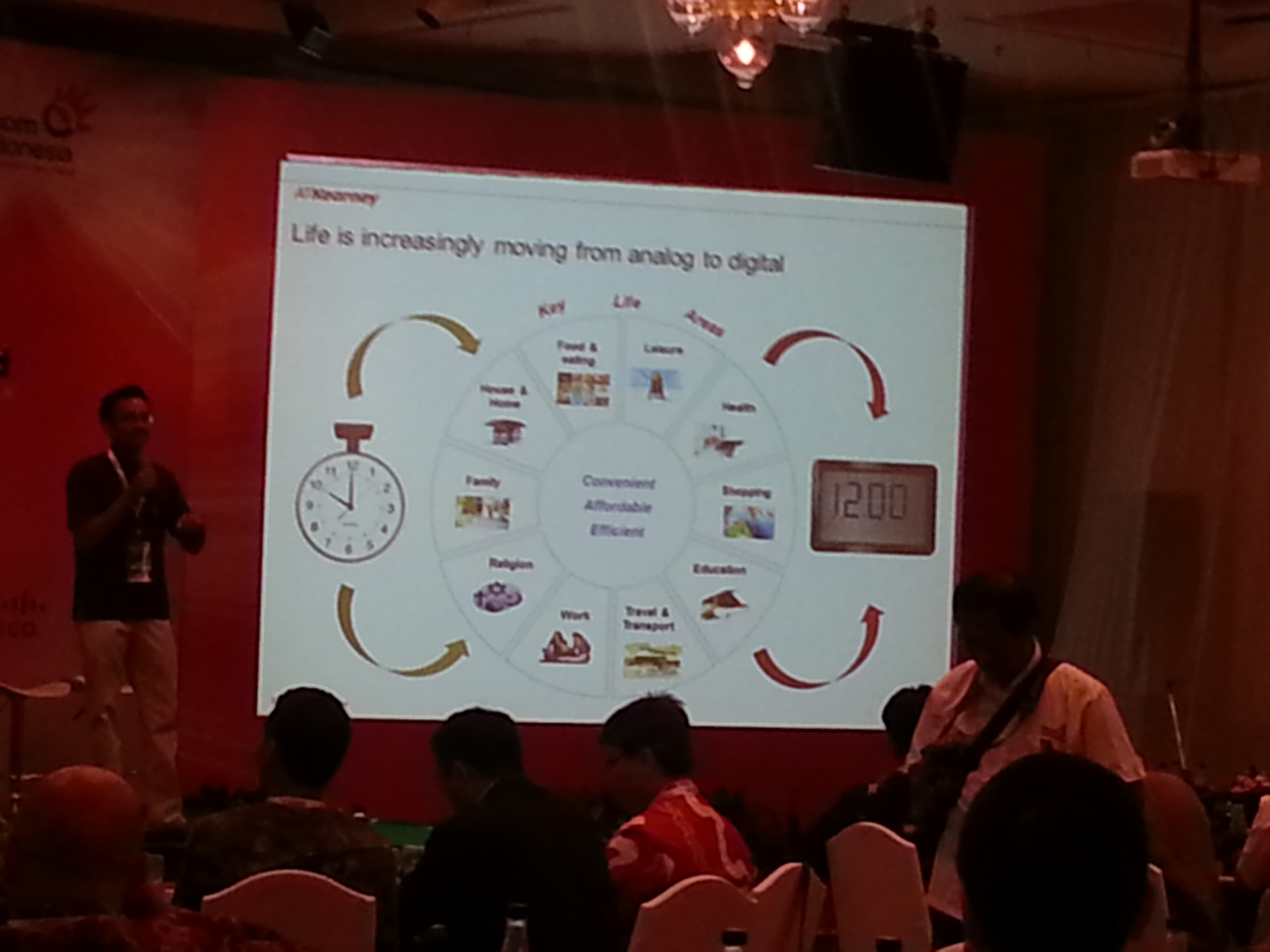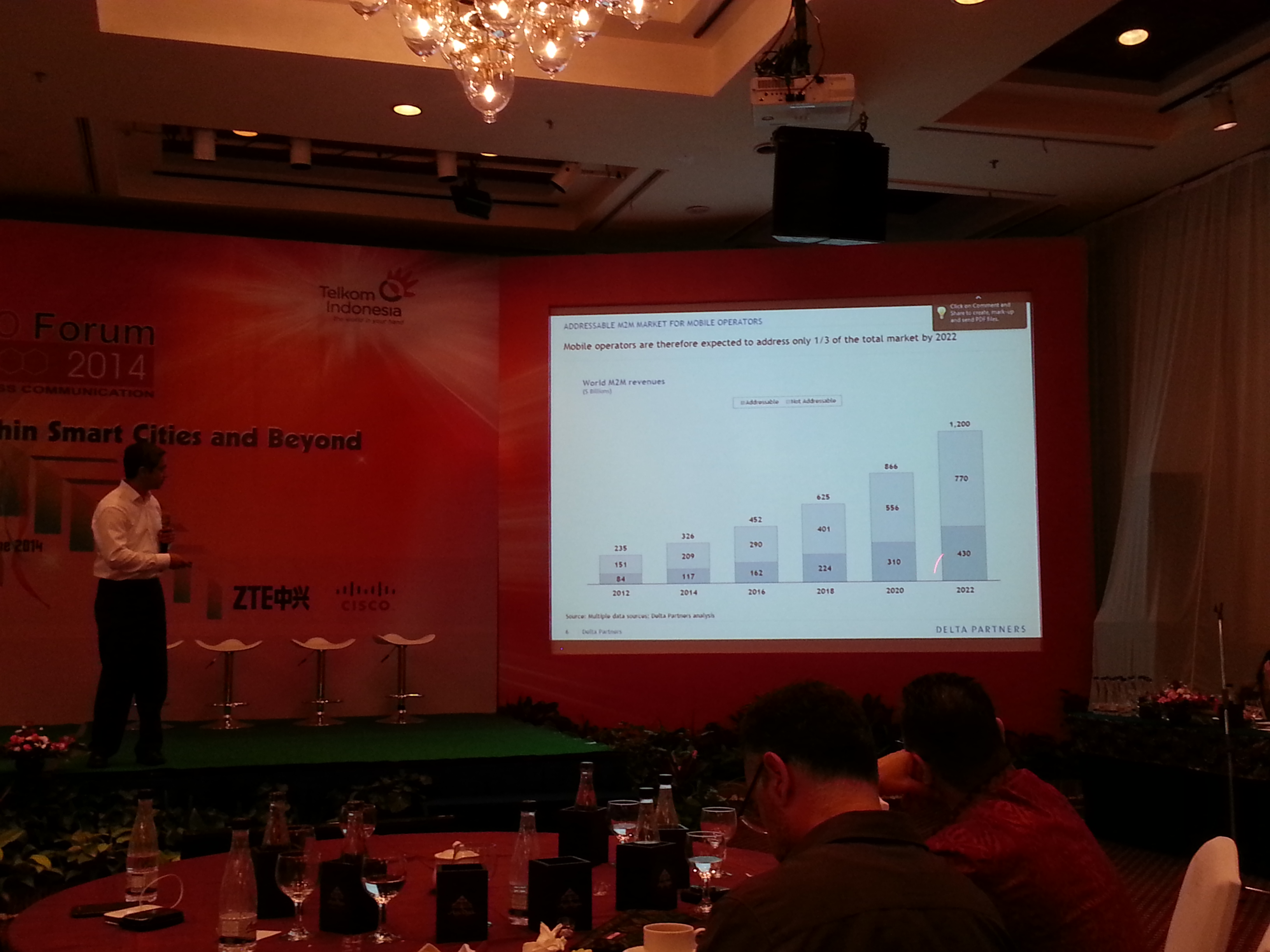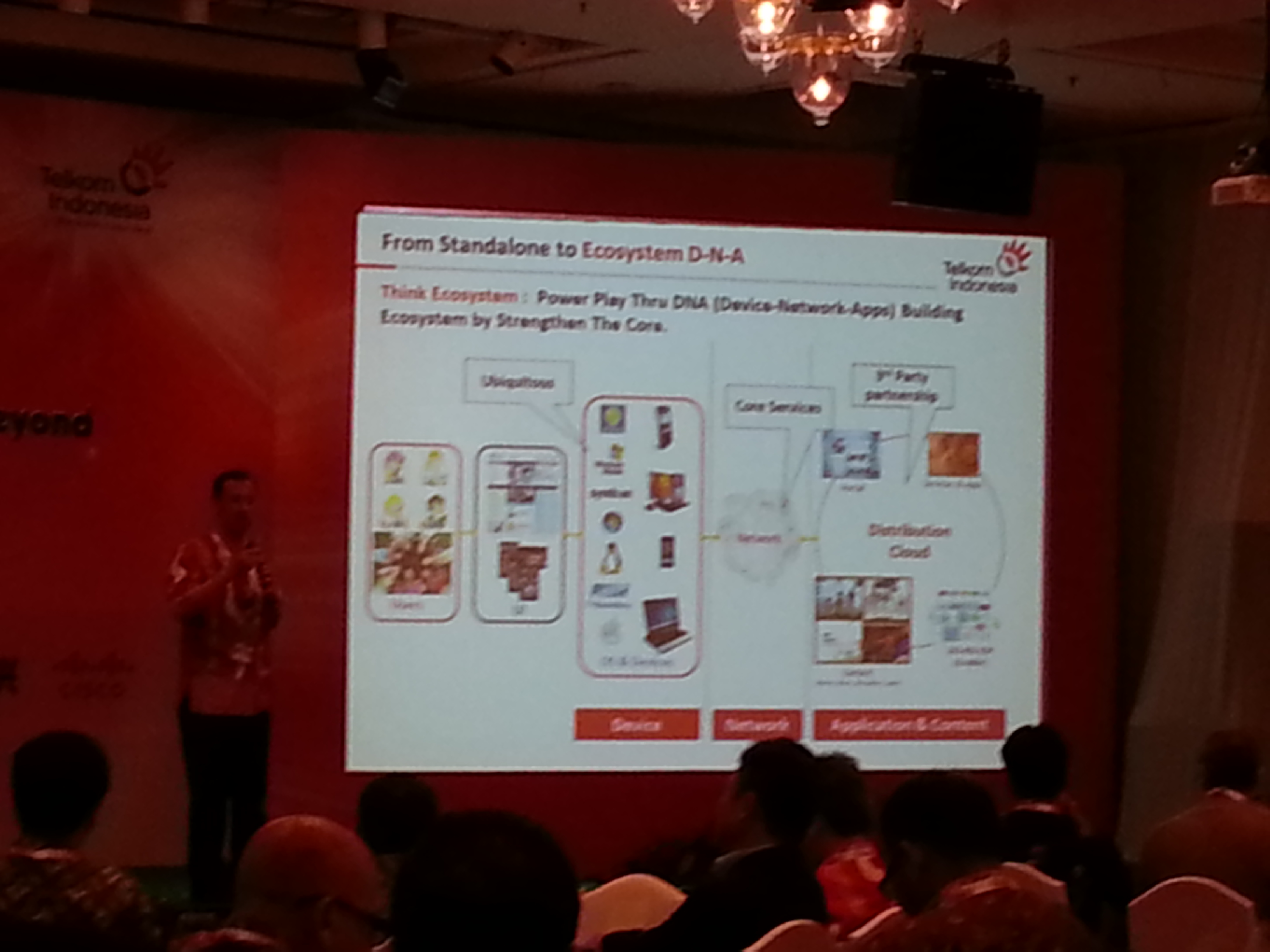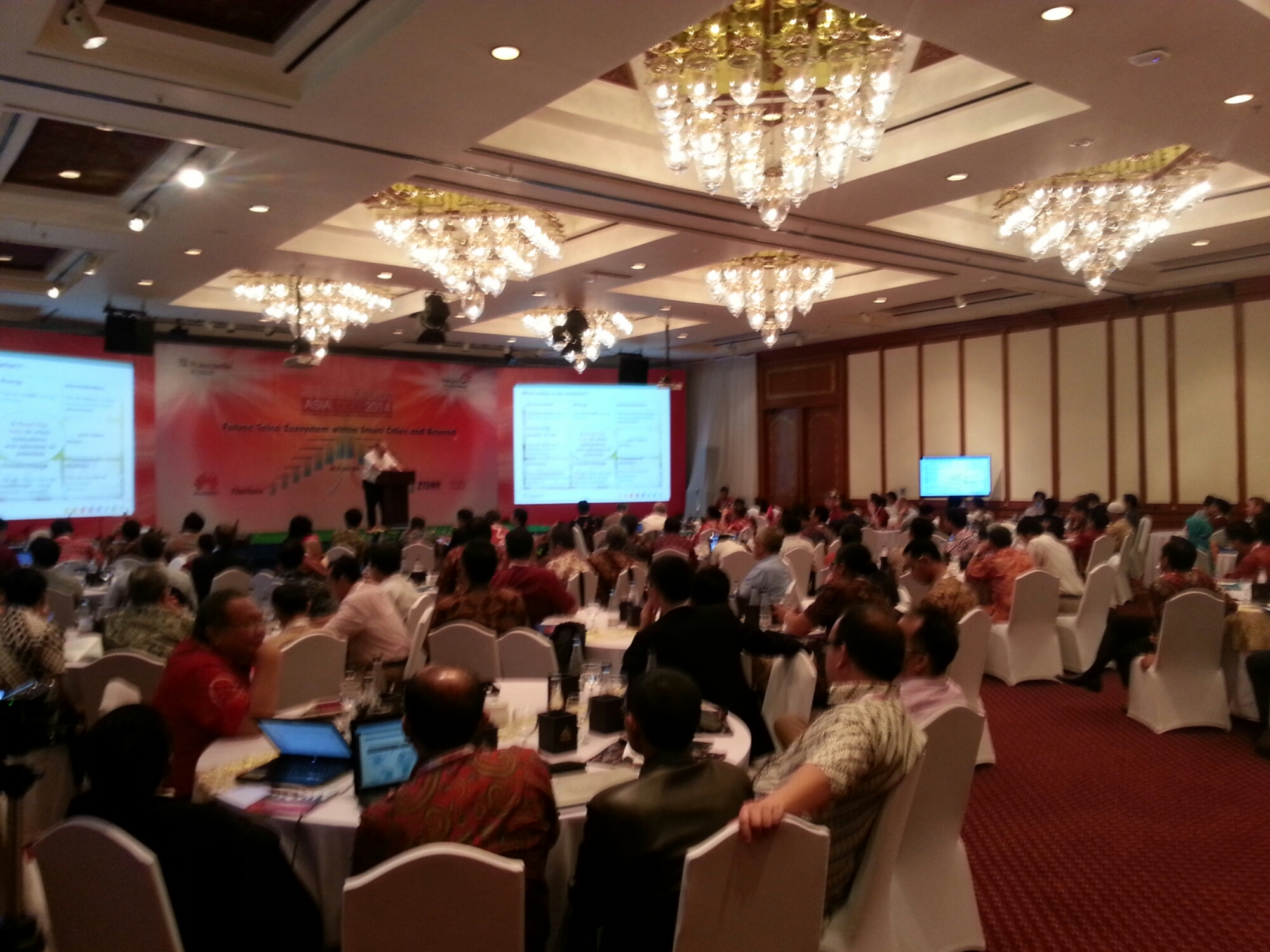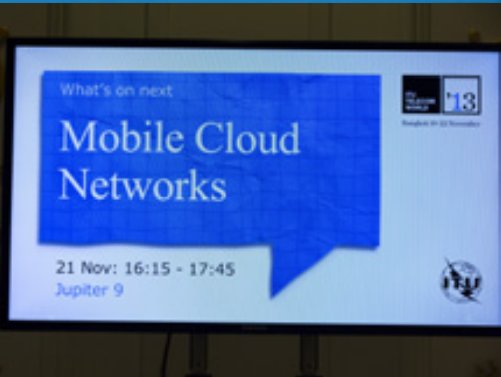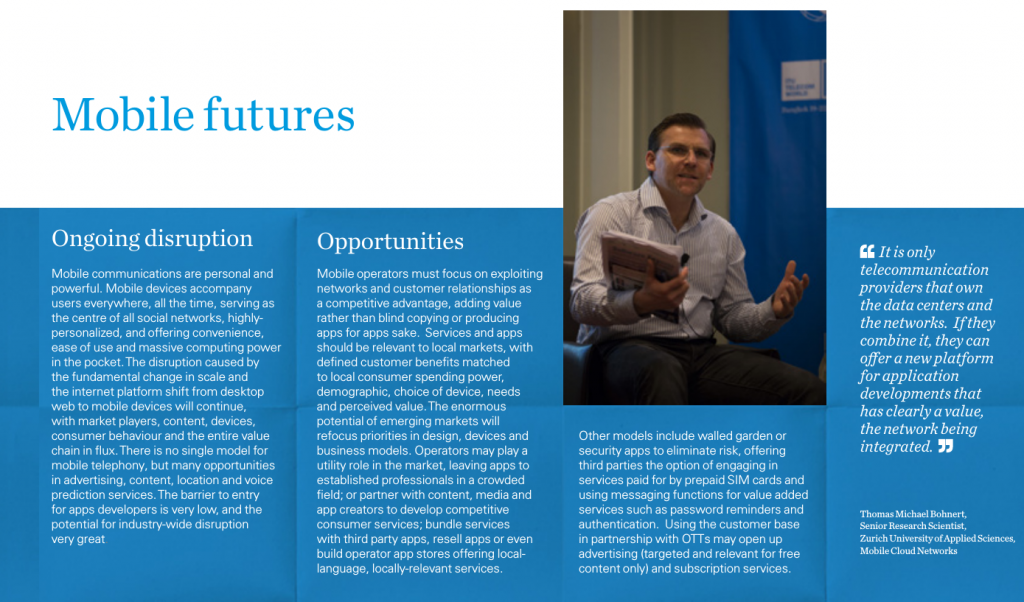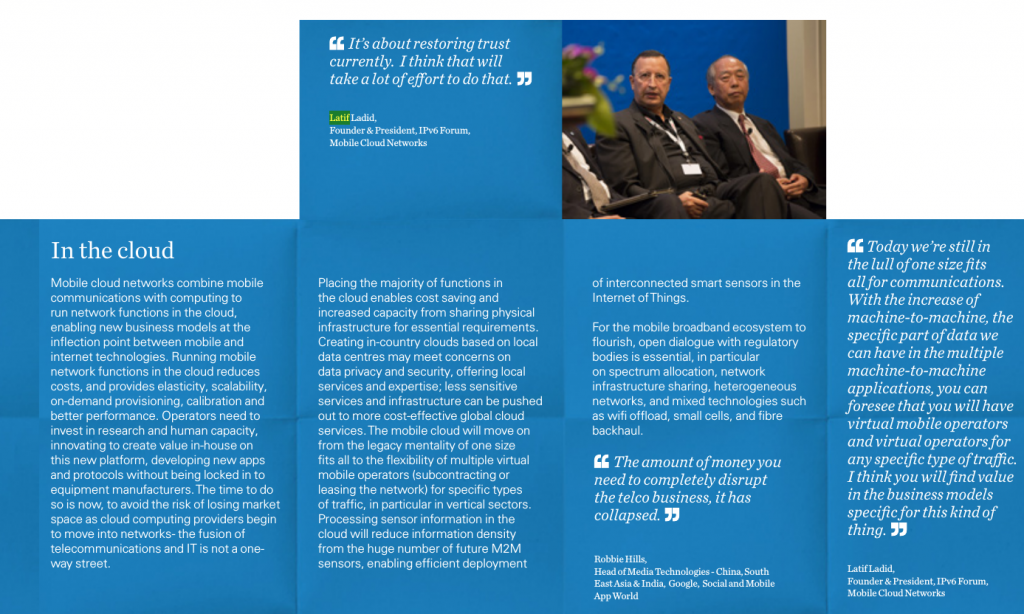Archiv der Kategorie: Telecom Industry
Opening at the FUSECO Forum Asia
ITU Telecom World 2013 – Mobile Cloud Networking Session – Outcomes
About the Mobile Cloud Networking Session. In association with the Mobile Cloud Networking project.
Mobile Cloud Networks combine mobile communications with computing to run network functions in the cloud, enabling new business models at the inflection point between mobile and internet technologies. Running mobile network functions in the cloud reduces costs, and provides elasticity, scalability, on-demand provisioning, calibration and better performance. Operators need to invest in research and human capacity, innovating to create value in-house on this new platform, developing new apps and protocols without being locked in to equipment so is now, to manufacturers. avoid the risk of The losing time market to do space as cloud computing providers begin to move into networks the fusion of telecommunications and IT is not a one-way street.
The full report can be found here http://tinyurl.com/ojhthzw
Webcast: ITU Telecom World Forum 2013, Panel Session “Mobile Cloud Networks”, Thursday 21 November (16.15-17:45, Bangkok)
The panel sessions will be webcast (audio and video). Questions submitted via a Twitter feed using the hashtag #ITUWORLDLIVE or by SMS or through the ITU Telecom webcast portal will be displayed on the Moderator’s laptop screen during the session.
Mobile Cloud Networks
Thursday, 21 November 2013, 16:15 – 17:45, Jupiter 9
Innovative services and products over the next decade will be strongly driven by cloud computing technologies. Research communities on cloud technologies will need to address challenges such as radio access in the cloud, new opportunities for sharing of infrastructure, open source, SDN (software defined networks), new CDN (content delivery networks), and ICN (information centric networks). Globally, green requirements, performance and scalability studies and related impacts on policy, regulation and standardisation will also need to be addressed. Telecommunication networks need to be prepared for the requirements coming from cloud services, transporting the corresponding information in an effective and efficient way. The cloud concept is being brought into network architectures, by introducing virtualisation into all signal processing and information storage in the networks, and the service provision concept as a replacement for current network node functionalities. Game developers, network operators, OTT content providers and community operators will have a big role to play in these new paradigms. A broad view will be taken, addressing perspectives of innovation, standardisation, business models, implementation, roadmap, and so on.
Moderator
- Dr Thomas Michael Bohnert, Zurich University of Applied Sciences, Switzerland
Panellists
- Prof. Luis M. Correia, Associate Professor, Instituto Superior Técnico – Technical University of Lisbon, Portugal
- Dr Neil Davies, Founder and Chief Scientist, Predictable Network Solutions, United Kingdom
- Mr Latif Ladid, Founder & President, IPv6 Forum, Luxembourg
- Mr Peter Riedel, Executive Vice-President, Rohde & Schwarz, Germany
- Dr Masao Sakauchi, President, NICT, Japan
Cloud Computing: Savior of the Telecom Industry?
Cloud Computing (IaaS/PaaS/SaaS) services offered by Telco carriers are gaining momentum.
An excellent overview – from 2011 – is provided by KPMG’s „Telcos advance in cloud computing“. The following table is borrowed from this report.
Meanwhile, some of these offerings materialized / matured and several others were added. Here is a list of a few very prominent ones.
Infrastructure-as-a-Service
- Telefónica invests in Joyent and runs an Infrastructure-as-a-Cloud (IaaS) service, the Telefonica Instant Servers
- NTT Communications Enterprise Cloud runs a virtualized Infrastructure as a Service (IaaS) offering, with the availability of data centers in the United States, the United Kingdom and Asia Pacific.
- AT&T Synaptic Compute as a Service with VMware vCloud Datacenter Service is a pay-as-you-go cloud computing solution that lets you access virtualized servers in the AT&T cloud. AT&T was positioned as a leader in the Gartner Magic Quadrant for Cloud Infrastructure as a Service (December, 2010)
- Cloud Computing Services by Verizon Terremark
- Deutsche Telekom maintains a significant share in Zimory
- Portugal Telecom launched its Smart Cloud service
- AT&T is OpenStack platinum sponsor and member of the Board of Directors
- Swisscom become major investor in Piston Cloud, an OpenStack Enterprise provider
Platform-as-a-Service
- Nodejitsu, provider of the state of the art node.js-based Platform-as-a-Service, and Telefónica Digital, the digital innovation unit of telecom giant Telefónica, have announced a partnership to deliver Nodejitsu’s hosting to the European market using Telefónica’s data centers.
- NTT is developing platform-as-a-service (PaaS) software based on Cloud Foundry, which is a cloud-computing-based open source software PaaS (open PaaS).
- AT&T Platform as a Service is a complete application development and lifecycle management platform.
Invited to talk about Software-defined Networking at the ITU Telecom World 2012
ITU Telecom World 2012 is the leading platform for the global ICT community to connect, debate, network and share knowledge. Key stakeholders from across the entire industry ecosystem will come together in Dubai from 14 -18 October to harness the power of ICTs to create real change. This exclusive Leadership Summit will bring together global leaders responsible for shaping the ICT visions, policies and strategies of the future.
At the core of the World 2012 programme are the Panel Sessions, where leading industry figures engage in lively discussion on the key topics and future trends impacting the world of ICT and the world in general. These trends and topics will each be examined and debated from the three principle perspectives uniquely inherent to the industry: technology, business and policy.
It is therefore a special honour to be invited as Panel Speaker and a great feedback for the ICCLab as such.
From the Invitation Letter:
On behalf of Mr Blaise Judja-Sato, Executive Manager of ITU Telecom, we are pleased to enclose the official invitation letter extended to you by Dr. Hamadoun I. Touré, ITU Secretary-General, inviting you to participate in the Forum of ITU Telecom World 2012.
This is a brief description of your panel session:
Open Source Routing Monday 15 October, 15:45-17:00 One of the key drivers of the proliferation of the internet was the adoption of managed open source for the domain name infrastructure (BIND). This enabled an open, interoperable yet affordable internet for all. Today, a similar revolution is happening through trends in the virtualization of network resources such as OpenFlow. Open source routing is a new initiative that will help establish a “platform” supporting committers and communities behind the open source routing protocols. No longer will there be a reliance on equipment vendors’ proprietary hardware and closed software stacks that don’t adapt to rapid changing requirements. Virtualization and open source routing will bring a lot of disruption in the industry and also a lot of new services to the public.
Kindest regards,
ITU TELECOM Place des Nations | CH-1211 Geneva 20 | Switzerland
SAP Forum 2011, Mexico City

Invited as speaker by SAPs Telco Industry Unit I had the pleasure to talk at the SAP Forum 2011 in Mexico City. Great event, well attended and even so organized.
The Telco Session was very well engaged and featured excellent speakers.
= Telco 2.0: New Business Models for Telco companies, Simon Terrance, CEO, STL Partners
= Sustainable Business for Telecom Industry, Jens Amail, SVP and Head of SAP Telecommunications Industry
= Monetizing Services in a hyper-connected World, Martin Schmid, Sales Director Convergent Charging, SAP
= Cloud Computing, New Technologies, and Co-Innovation, Thomas Michael Bohnert, Technical Director, SAP Research
An amazing speech with lots of insights was given by Simon. I especially enjoyed the discussion around Softbank, a telco that hands out femto cells plus DSL backhaul for FREE to its mobile subscribers in order to enhance mobile experience. A pure accident that femto cells were an element in my talk as well. Another interesting topic was the upstream-downstream business concept: Telcos as facilitator in the very heart of the Internet century.
Jens took on and presented SAPs strategy for the telco industry high-lightning convergent charging and and real-time analytics. Who says SAP does not have a reasonable telco footprint. With Highdeal first, and now Sybase, SAP took measures and if continued, may eventually exploit its huge experience and eco-system to become a true telco big-player.
And there was also Martin, an SAP telco veteran, making a strong case for convergent charging in a hyper-connected world, with cloud computing, mobile adds, services, or in general value-add at the forefront.
Finally, pleasure was mine to talk about tech transformations. To cut short, it was amazing to talk to an engaged crowed. The slides can be found here
Product versus Service Business – Service Economies and the Internet
A paper by my SAP colleague Andreas F. promotes the research discipline „Service Science“. His (well-known) point is that modern economies turn into service economies by market forces. So what distinguishes „services“ from „products“ and what are explicit/implicit features of „service economies“. But this what „Service Science“ is all about, right?
An interesting and valid observation especially exemplified in the telecom and software industry. Just watch the statement of NSN in an earlier blog post. It claims that „50% of NSNs business is operating networks“ (network-as-a-service). The same applies to Ericsson, Huawei, Alcatel-Lucent, and others with only the actual ratio different.
The question to therefore not whether „servicefication“ is a valid observation but rather a.) „What is the right strategy for the sector and b.) which role the Internet may hold (technology and business).
SAP Research has a long track record in investigating these questions under the umbrella-term „Internet-of-Services“. Essentially the idea is to extend the current Internet into a „Global Service Delivery Framework“ that supports „service-based economies“ that then turn into „web-based service economies“. This is a bold statement and no economy will turn fully web-based, definitively. But the broader concept is valid. Personally I favor the term „Internet Business Platform“, mostly since „Service Delivery Platform“ is associated with a long-lasting concept in the telco domain.
For more about SAP Research „Internet-of-Services“ check the IoS-Portal.
The GEYSERS Project
The GEYSERS project met in Zurich for its first General Assembly. One year on track, good progress, first results.
GEYERS is a project worth to keep an eye on. A strong technical vision aims at bringing together the IT and Telco world with a clean architecture for „Telco+IT“ fulfillment (Connectivity, Storage, Computing in a Service-oriented Design).
At first sight this is not fundamentally new. Yet GEYSERS definition goes beyond pure Telco-based (GMPLS) provisioning with some (GRID-like) IT resources at edges plus some Web-Service interfaces.
By defining an SML-layer, that is based on Service-oriented Infrastructure concepts, IT-standards, and SLA-based service composition and orchestration, GEYSERS reference architecture turns into a complete Infrastructure-as-a-Service framework for public/private Cloud Computing with a IT-northbound / Telco-southbound interface. All this based on accepted concepts and respective open standards in the IT plus Telco domain.
For more details check the architecture reference model at the FP7 GEYSERS Website and the technical specs at GEYSERS Tech-Specs
Do not miss the GEYSERS Video!
ICIN 2010 in Berlin
I was attending ICIN 2010 in Berlin. My keynote on „Global Future Internet Research“ can be found on the conference website (link below).
Worthy conference with a good number of talks/attendees. Particularly interesting I found the mixture of people from research and those working on innovation and/or general management.
Few takeaways:
+ IaaS (network+storage+computing) seen as good business model for telcos in the future
+ Value of enforcing an extra revenue share from Google questionable since 25bn (Google) versus 1000bn (Telcos) is peanuts (CEO of Northstream).
+ Appstores/developer communities for telcos of limited value since Appstore mainly a tool for device sales (mobile device manufacturers)
+ Telco““““s shall better look into many smaller business models rather than looking for the next SMS-like killer app (H. Arnold, T-Labs)
The slides of the keynote speakers are meanwhile available for download
